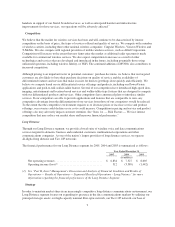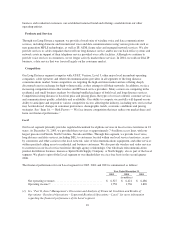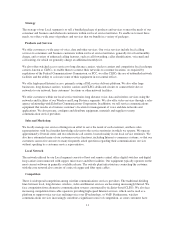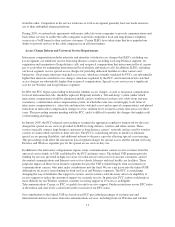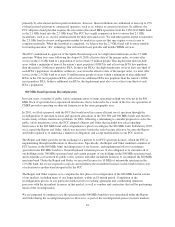Sprint - Nextel 2005 Annual Report Download - page 29
Download and view the complete annual report
Please find page 29 of the 2005 Sprint - Nextel annual report below. You can navigate through the pages in the report by either clicking on the pages listed below, or by using the keyword search tool below to find specific information within the annual report.local exchange carriers and third party database providers. These upgrades are not within our control and we
cannot unilaterally deploy E911 services. With respect to our iDEN and CDMA network services, the more
accurate information delivered in Phase II can only be determined if the customer is using a handset with global
positioning satellite, or GPS, capability.
Because our Phase II E911 services can be accessed only with GPS capable handsets, the FCC has required that a
certain percentage of new handset activations be GPS capable, and that 95% of our total subscriber base use GPS
capable handsets by December 31, 2005. All new handset activations are currently GPS capable. However, we
were unable to meet the December 31, 2005 deadline to convert our existing subscriber base to GPS enabled
devices. We have filed a request for a waiver that seeks additional time to comply, on which the FCC has not yet
ruled. Failure to comply with the FCC’s rules may result in FCC sanctions.
The costs we may incur in an effort to accelerate our customers’ transition to GPS capable handsets to meet these
requirements could be significant, and will be dependent on a number of factors, including the number of new
subscribers added to our network who purchase GPS capable handsets, the number of existing subscribers who
upgrade from non-GPS capable handsets to GPS capable handsets, the rate of our customer churn and the cost of
GPS capable handsets.
Truth in Billing and Consumer Protection
The FCC’s Truth in Billing rules generally require CMRS licensees, such as us, to provide full and fair disclosure
of all charges on their wireless bills, including brief, clear, and non-misleading plain language descriptions of the
services provided. In response to a petition from the National Association of State Utility Consumer Advocates,
the FCC found that state regulation of CMRS rates, including line items on consumer bills, is preempted by
federal statute. However, many states continue to attempt to impose various regulations on the billing practices of
wireless carriers, and the FCC is continuing to look at issues of consumer protection and the appropriate state and
federal roles. If states gain such authority, or there are other changes in the Truth in Billing rules, our billing and
customer service costs could increase.
CALEA Requirements
The Communications Assistance for Law Enforcement Act, or CALEA, requires telecommunications carriers,
including us, to modify equipment, facilities and services to allow for authorized electronic surveillance based on
either industry or FCC standards. In September 2005, the FCC extended CALEA obligations to facilities-based
broadband Internet access providers and to interconnected VoIP providers, whether wireline or wireless. The
FCC has pending a range of issues involving CALEA, including CALEA compliance extensions and exemptions,
cost recovery issues, identification of future services and entities subject to CALEA, and enforcement matters.
We build our networks to industry standards, and those standards include the ability for law enforcement to
conduct authorized surveillance. Like other CMRS carriers, we have sought an extension of CALEA deadlines
for packet-mode data services and this request remains pending. If the extension requests are not granted, we
could be subject to fines if we are unable to comply with a surveillance request from a law enforcement agency.
Homeland Security
Homeland security issues are receiving attention at the FCC, from the states and in Congress. The FCC chairman
has announced plans for a new FCC bureau devoted to this area. We expect that several initiatives, including the
delivery of emergency alerts over wireless devices, and increased scrutiny of wireless carriers’ networks in the
aftermath of last year’s natural disasters, could lead to new regulatory requirements regarding disaster
preparedness, network reliability, and communications among first responders. We are unable to predict the
impact of these initiatives on our business.
18



